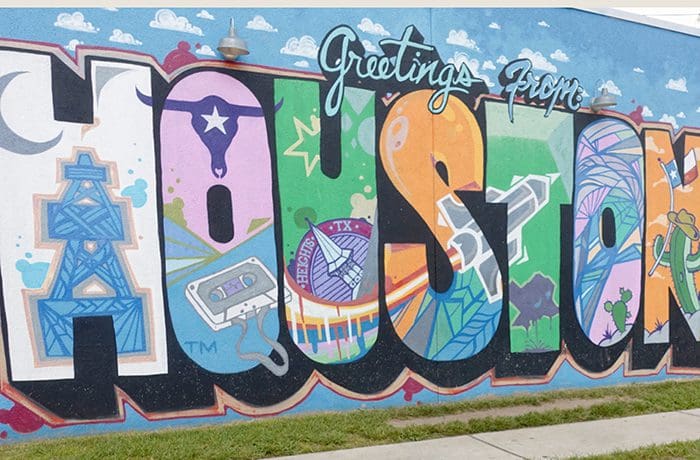How Houston is Different

In the last 2 weeks after the murder of George Floyd by police in Minneapolis, we have witnessed massive protests, demonstrations, marches, and rallies that have taken place across the nation in virtually every major city in the country. These protests are aimed at raising awareness about the injustices local police commit against black people in their communities and injustice towards African Americans in general. It seems that the tragic and inhumane episode in Minneapolis sparked a “tipping point” of intolerance at which people can no longer stand by and allow such awful events to happen.
Additionally, and concurrently, we saw in almost all the cities where the protests took place that they were accompanied by violence, rioting, arson, looting, physical injuries, and murders of both police and ordinary citizens. Many major cities have suffered untold physical and financial damage to both small and large businesses, to public property, to public buildings and monuments, and to infrastructure. This is unfortunate because much of the message has become blurred by the violence and threat to ordinary citizens.
There are several theories and rumors floating around about why these demonstrations and protests have turned so violent and destructive. Many say that the agitation served as a fire starter for the explosive violence and chaos which came from the outside and was organized by groups such as Antifa, extreme liberalist groups, and White Supremacist groups. Reports in many of these cities where the destruction was most devastating say that many of the most violent and antagonistic actors were not from the respective communities and that they came from other states, sent in and funded by outside organizations and factions ,determined to cause chaos and destruction in these cities in an effort to dismantle the structures, agencies, and services that preserve safety, law and order, and a sense of normalcy for the cities and their citizens.
In fact, there are many reports in cities across the country where pallets of bricks and rocks were strategically delivered and placed in areas close to where the marches were to take place. That suggests that these materials were being supplied to cause destruction and havoc. There’s lots of conspiracy theories and hypotheses about who, why, and how all of this background activity took place, but regardless of what you believe about this, the fact of the matter is that the result was very destructive and harmful, with rioting, looting, burning, and injury to people, property, and streets in America. As this chaos unfolded it was easily observable that in some cities it was becoming “out of control”, it was ostensibly being “allowed to happen”, and very little was being done to stop the rioting, looting, and destruction occurring in these major cities. In the face of all this pandemonium, there was at least one major city where this level of shattering damage did not really erupt: Houston, Texas, the 4th largest city in the nation.
George Floyd was from Houston. He grew up here, he participated in the community, high school sports, got himself into trouble here, but at the end of the day he was recognized as being from Houston. So there was always the possibility of trouble erupting here, but it didn’t. Why?
As most people know, most of the large cities in the United States are run by Democrat mayors. In the case of most of the cities where the destruction has happened, there is a Democrat governor in place for that state. Texas is an exception to this with our Republican Governor Greg Abbott, although our mayor, Sylvester Turner, is a Democrat. He is different in the way he handled the threat of havoc – instead of clamping down, resisting, or avoiding hearing the message, he embraced it fully.
Houston’s Chief of Police, Art Acevedo, is also a different kind of police chief. If you spend a lot of time out in public attending Texans games, Astros games, or Rockets games, there’s a good chance you’ll run into our Chief of Police. He’s very visible, approachable, and friendly. I’ve met Art several times and he’s true to the phrase “you couldn’t meet a nicer person.” You also get the sense that his friendly style is in no way a sign of weakness, because his strength and resolve are evident as well. When all of this erupted last week, true to form Art Acevedo went out on the streets. He talked to the people. He made it clear that he was not only supportive of their protests, but that he was going to march with them. And he did. He literally marched in the street with his fellow citizens as part of the protest rally. So did Mayor Turner. The two most visible public figures in our city not only endorsed and supported the First Amendment right to protest, they embraced it, got behind it, and let the citizens here know that they were with them.
But our local leaders do explain it alone. Again, the question is: why didn’t it erupt in Houston? As the awareness, concern, and fear grew about what was happening across our nation, many people from other cities asked me, “how’s it going in Houston?” And my response was, “There’s virtually nothing like you’re seeing elsewhere happening here. Yes, there are protests and marches, but they’re not violent and destructive. No burning buildings, yes a few flare ups, but almost nothing in comparison to what you’re seeing elsewhere.” In fact, the only scenes of destruction and looting took place at a Forever 21 store in the Galleria (Houston’s major shopping mall), where the glass windows were shattered, and at a downtown Verizon store, where the glass was smashed and the store looted. That and a few damaged police cars are the extent of the damage in Houston.
My friends around the country would then ask why I thought this was the case. One guy asked, “What is in the water there that has people act differently?”
My response was that there are three reasons things. The first is, people here are part of what I’ll call the ‘Texas culture’, which is very mannerly, polite and respectful. People say ‘sir’ and ‘ma’am’ here in addition to ‘y’all’ – they really do. At the heart of that culture is a respect for each other, each other’s property, and each other’s professions, no matter what profession. Now here’s my take on Houston: people didn’t come here for the weather and they didn’t come here for the view. I personally lived in a condo on the beach in Northern California, where I could watch the sun come up over the ocean off my balcony, feel the sea breeze and smell the salty sea air. I joined a consulting firm and was asked to live here for 1 to 2 years as a partner – that was in 2001. I’ve never left, and I probably never will. Since people didn’t come here for the weather and the view, they came here to work and make a living, to take care of their families, and to afford themselves a decent lifestyle. And people work very hard to have that here. Having worked for it, they certainly wouldn’t do something to destroy it, because they know what it took to get it there in the first place. In conclusion, people have respect for each other and each other’s property.
The second reason, I said, is that there is an implicit respect for the law here. Sure, we have crime because it is the fourth largest city in the country – but not the kind of crime nor the level of violent crime that you see in a city like Chicago and other large cities. People here don’t have tolerance for criminals and criminal behavior. The laws are tough, and if you buy the theory that people only respond to force and coercion, it leans more that way than letting people run amok. There are consequences for breaking the law and they are enforced quickly and decisively. People back up the police here and, by and large, they trust the police to do the right thing; and generally, they do.
The third thing is that the Texas gun laws allow people to buy, own, and use guns. Not just rifles, but handguns and the notorious assault rifles. That leaves the possibility that anyone you encounter might be a gun owner and, more importantly, that they could be in possession of a gun. Committing a violent crime could have serious consequences depending on when and against whom you commit the crime. That summarizes for me the question “what’s in the water?” It is those three things combined: 1) manners and mutual respect, 2) respect for the law, and 3) call it the vigilante effect – the possibility of ordinary civilians enforcing the law as the situation arises.
Now, compare the lack of violence, the actions of Houston’s leaders, and the culture in our city with what happened in New York, Los Angeles, and Chicago, their leaders, and their culture. Big difference. Big gap. In those cities, the people were “talked at” instead of “talked with” by their city leaders. Policies were issued and dictums delivered, orders were given. That, for me, explains how come in the fourth largest city in the country there was virtually no problem. I’m not saying that Houston is perfect, we’ve got lots of work to do. But I can tell you this: the rule of law is respected here; people are treated with respect and dignity by public officials; and people treat each other with respect and dignity in our communities. I think the cities in the United States could learn a great lesson by studying what’s happening here compared to what happened in their city.
I’m proud of our city. Well done, Houston.
Peace.
Kevin Cullen is President of Leadera Consulting Group, specializing in producing breakthrough business results. If you want more on this conversation or the firm, contact us at Leadera Consulting Group.
Kevin Cullen: kcullen@leaderacg.com, cc: acook@leaderacg.com
